Search
Showing 10 of 1193 results for Value-priced treatments https://simplemedrx.top
-
Innovation at Mission New Zealand
With support from the product and service diversification pilot funding round led by Education New Zealand Manapou ki te Ao (ENZ), the new platform is being developed and managed by The Mind Lab.
Mission New Zealand offers a fully immersive and distinctively New Zealand experience. It focuses on the key differences that New Zealand offers and the benefits of being part of a movement for positive change. A range of shorter learning opportunities are grouped under four themes that reflect New Zealand’s progressiveness and values: culture, tech innovation, creativity and sustainability.
Visitors to the site will be greeted by the world’s first 360° virtual pōwhiri, starting at the gates of Ngāti Whātua Orākei Marae in Auckland. They will experience being called onto the marae with a karanga and stepping onto the grounds to be welcomed by members of Ngāti Whātua.

A screenshot from Mission New Zealand's virtual pōwhiri
Personalised learning, with optional content and stories, insights and other material will help learners experience what makes New Zealand unique.
The new platform is designed to address the increasing global demand for connecting with a visible cause, for online learning options, and for shorter and more flexible courses.
There are still opportunities for New Zealand education providers interested in being part of this opportunity, before the marketing campaign gets underway over the next two months. The site will enable providers to test the demand for their short courses and micro-credentials in areas of New Zealand specialist expertise.
This project is part of ENZ’s programme to encourage the development of new products and services in the international education sector, supported by the COVID Response and Recovery Fund.
The Mind Lab was founded in 2013 and has a strong background in innovation, online delivery and building community connections, including relationships with iwi and Māori-led organisations.
-
Te Wiki o te reo Māori - Māori Language Week 2022
The Ikubunkan Institute of Education in Tokyo facilitates a one-year study abroad programme for students to attend high schools in New Zealand, Australia and Canada. Pre-COVID, Ikubunkan sent 100 students annually to NZ for three terms at 100 public schools.
Because students have learned kapa haka/waiata at different schools they have developed their own Ikubunkan’s style of kapa haka when practising as one school.
Ikubunkan students performed haka for the former Māori Development Minister Te Ururoa Flavell, who visited the school in 2016. They also performed haka for the Prime Minister at the NZ Embassy Tokyo, when she visited Japan during the RWC in 2019.
You can read more from the full Daily Mail story here.
-
Prime Minister welcomes international students
One of many welcome events around the country since our borders reopened at the end of July, the ceremony was attended by more than 70 students, as well as representatives of UoA and Education New Zealand Manapou ki te Ao (ENZ). It was an emotional moment for some of the students, who had been waiting a long time for the opportunity to study here.
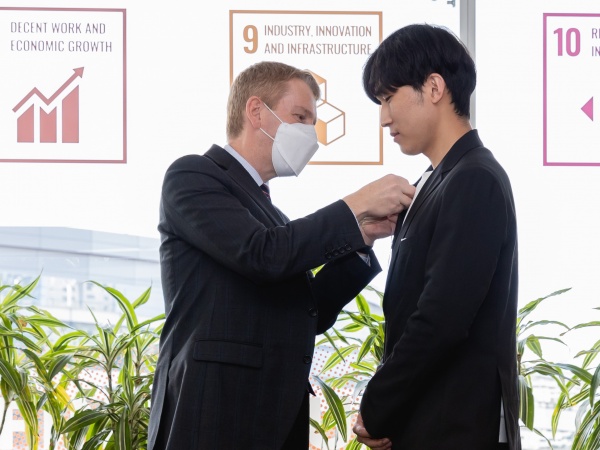
Minister Hipkins presenting a Tū Ngātahi pin to international student Kyeongmin Kang from English Language Academy
Tū Ngātahi pins were presented to international students Petchpiangpor Sueasuwan from Western Springs College; Kyeongmin Kang from English Language Academy; and Ankeeta Karmakar from UoA by the Prime Minister, Minister Hipkins and UoA Vice-Chancellor, Professor Dawn Freshwater respectively.
ENZ Chief Executive Grant McPherson explained the significance of the Tū Ngātahi pins, which you can read more about here.
The formal welcome was followed by morning tea, with further exchanges of Tū Ngātahi pins and opportunities for photographs.
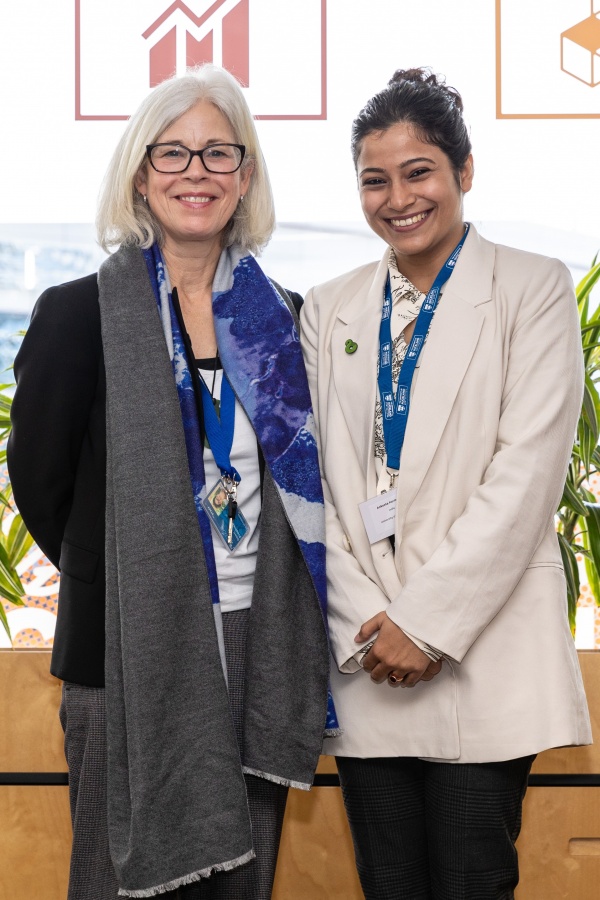
Professor Dawn Freshwater, Vice-Chancellor at University of Auckland, with university student Ankeeta Karmakar.
International student Malina Grube from the University of Auckland spoke about her experiences here, and her involvement in the kākahu project.
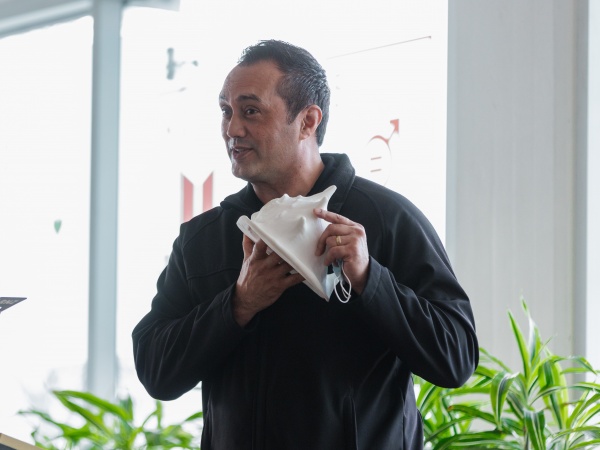
Michael Steedman, Kaiarataki at the University of Auckland, demonstrated a 3D-printed conch shell as part of his welcome to guests – a metaphor for new arrivals and new opportunities.
-
Latest recipient of innovation funding will strengthen indigenous links
Te Whare Wānanga o Awanuiārangi (TWWOA) is the most recent recipient of support from the International Education Product Innovation Fund, administered by Education New Zealand Manapou ki te Ao (ENZ).
TWWOA’s pilot project ‘Iwi taketake: an Indigenous postgraduate curriculum’ will see the co-construction of an international Indigenous curriculum from post-graduate certificates through to doctoral studies.
The new curriculum will be developed and delivered with Indigenous college graduates based at Hawai’i, Washington State, Canada and Australia, and will strengthen relationships with and between Indigenous communities and education providers in the United States. The pilot project will demonstrate how applied Indigenous postgraduate education can deliver value for Indigenous communities who are more used to being the subjects of research, rather than the beneficiaries of it.
The first ‘co-badged’ qualifications, awarded jointly by TWWOA and partners offshore, will be offered to learners from 2024 onwards.
The International Education Product Innovation Fund is a New Zealand Government-funded initiative, managed by ENZ, to reimagine how an education from New Zealand can be delivered and create impact for global learners. Learnings from this stream of work will be shared for wider benefit to the sector in late 2023.
Visit the Product Innovation Fund page to learn more and discover all the pilot projects the Fund is supporting.
-
Hands-on environmental studies for US students
EcoQuest Education Foundation is a charitable trust and PTE based in Whakatīwai, with strong connections to Ngāti Paoa and Ngāti Whanaunga.
“We had a wonderful day on the Wharekawa Coast,” says Ria Brejaart, EcoQuest’s Academic Director.
“Led by mana whenua, our students welcomed special guests US Consul General Sarah Nelson, Director of USA Study Abroad Heidi Manley, and Senior Education Advisor US Consulate General, Katie Sleeman. EcoQuest’s Board of Trustees and academic associates also attended the event, along with other key supporters.
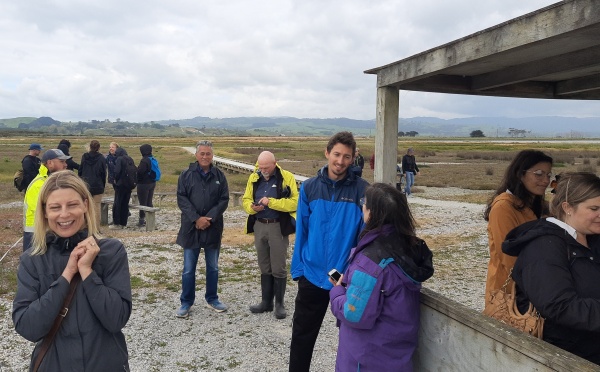
EcoQuest team and manuhiri at the bird hide.
“It was a great way to celebrate both the return of our US students after a long Covid-19 hiatus, and our enduring relationships with our collaborators and supporters. It felt particularly apt to be on the shores of Tikapa Moana, where the kuaka (bar-tailed godwits) return each year from Alaska.
“The morning of observing birds on the shell-banks was followed by a visit to Pūkorokoro Miranda Shorebird Centre, for a talk by Keith Woodley, Centre Manager. We then returned to EcoQuest where we marked the occasion by presenting Tū Ngātahi pins to all our students, on behalf of Education New Zealand Manapou ki te Ao.”
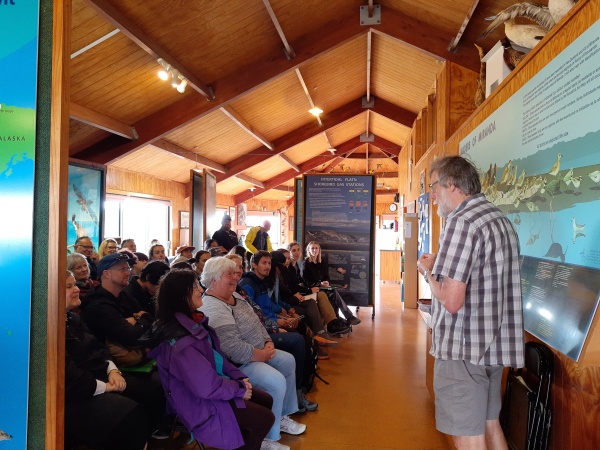
A presentation from Keith Woodley (Pūkorokoro Miranda Shorebird Centre Manager). Front row left, Beth Coleman (EcoQuest Board Chair) and Sarah Nelson (US Consul General).
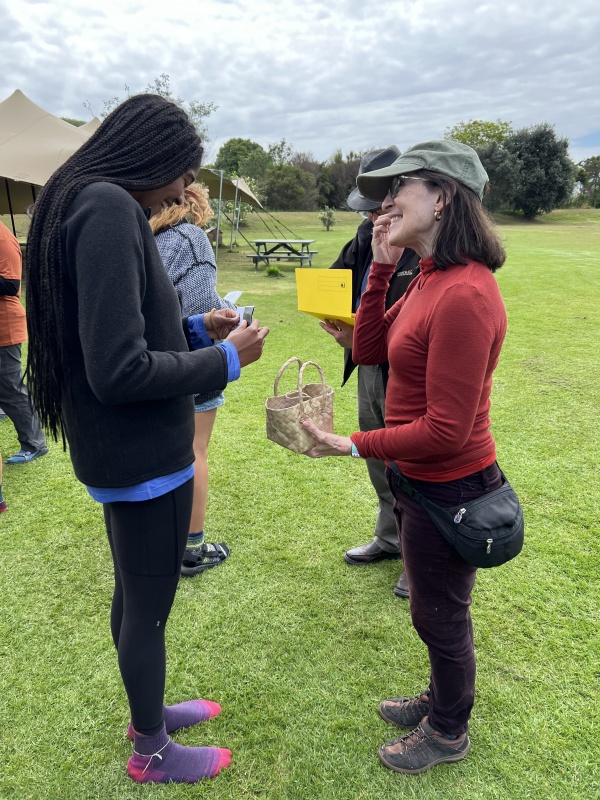
Beth Coleman (EcoQuest Board Chair) and Jono Clark (Director) presented Tū Ngātahi pins to the students.
The eighteen students are from the University of New Hampshire (UNH), Cornell University, University of Michigan, and Colorado State University. They are participating in a fifteen-week residential semester programme with EcoQuest, which offers undergraduate programmes in partnership with UNH. Students gain credits for their undergraduate degrees back home.
“Within the international education sector, EcoQuest contributes high-quality, niche programmes,” says Alana Pellow, Business Development Manager at ENZ.
“These international student programmes align well with New Zealand’s areas of excellence in ecology, restoration ecology, environmental policy, and sustainability. EcoQuest students undertake real-time research for many different collaborators including iwi, NGOs and trusts, councils, private land owners and the Department of Conservation. Academic and scientific rigour are the basis for these unique hands-on learning opportunities.”
“EcoQuest also contributes to international thinking around indigenous approaches to sustainability, through inclusion of elements of Te Ao Māori and mātauranga in its education and research activities.”
The current students are part of Cohort 4, the final cohort of international students to be given entry to New Zealand through a border exception earlier this year. Cohort 4, which was jointly led by ENZ and the Ministry of Education, saw 5,000 international students from 109 different countries nominated for student visas, before New Zealand’s borders fully reopened in August.
-
Join us for the Latin America Study with New Zealand Virtual Fair
“The fair will be a great opportunity for providers to connect with prospective students in the Latin American market, using an interactive digital platform,” says Javiera Visedo, Director of Engagement Latin America for Education New Zealand Manapou ki te Ao (ENZ).
“ENZ is seeking expressions of interest in the fair, which we are hosting in collaboration with FPP. If you are interested in participating, please fill out the Expression of Interest form by 9 December 2022.”
Invitations to register will follow in the new year.
Find out more about Latin America
Key areas of focus for ENZ in Latin America include Brazil, Colombia and Chile, and we have staff based in São Paulo and Santiago.
Close to 6,000 international students came to New Zealand from Latin America in 2019, and Brazil is our eighth largest market. Since the pandemic there has been intense activity from our competitors with many of them establishing in-country representatives, which demonstrates the importance of this region in international student recruitment.
Beyond student recruitment, ENZ also values the government and education connections with the region.
ENZ recently hosted a series of Latin America Masterclasses, which saw participants from around Latin America tuning in to watch live lectures delivered by New Zealand academics.
In June this year, Education Minister Chris Hipkins created great buzz with his visit to Brazil and Chile, part of his first international trip since the beginning of the pandemic.
Group recipients of the Prime Ministers’ Scholarships for Latin America have recently started making their way to Brazil, Colombia and Chile to participate in short study exchanges. These include several Māori led groups, supporting connections with indigenous nations in the region.
In September, ENZ attended the FPP Virtual Fair in Colombia. The fair had more than 800 visitors, with over 100 visiting the ENZ booth. There was strong interest in tertiary programmes and language studies. The virtual fair was a great opportunity to promote New Zealand as a study destination within the Latin American market.
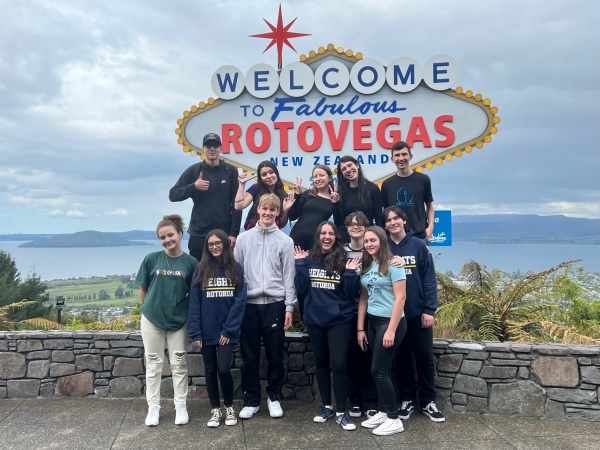
A group of 100 high school students from Paraná State in southern Brazil had a three-month study experience this year with schools in Auckland, Rotorua, Hawkes Bay, Palmerston North, Wellington, Canterbury and Invercargill.
Brazil
In 2019, there were 3,324 Brazilian students studying in New Zealand. Being from non-English speaking countries, the majority of Latin American students will start their education experience in New Zealand studying English. Scholarships offered by the local state governments have also contributed to the presence of Brazilian students in New Zealand and in 2022, 100 students from the state of Parana in Brazil travelled to New Zealand on a 3-month exchange. The students were placed at high schools across the country and gave positive feedback about their time here.
Colombia
Colombia is New Zealand’s second largest market in Latin America, second only to Brazil. In 2019, there were 1,360 Colombian students studying in New Zealand.
In 2023, 22 students from Bogotá, Colombia, will travel to New Zealand to study during terms one and two. Most of the students will be based at schools across the North Island, with one group heading down to Nelson.
On 23 November 2022, ENZ launched the I AM NEW campaign in Spanish at an event in Bogotá, to promote a New Zealand education.
Chile
The recent CAPE LatAm ‘Celebrating 50 years of diplomatic relations with Chile’ event, hosted at Parliament, was a great example of the rich history of connections between New Zealand and Chile.
Chile is New Zealand’s third largest market in Latin America. In 2019, there were 1,193 Chilean students studying in New Zealand. The majority of Chilean students come to New Zealand to study English Language, but enrolment in schools has also been consistent, with 17% of students studying at New Zealand schools in 2019.
Flights
Latam will be resuming their daily flights to Sydney via Auckland from mid-December and Qantas is flying three times per week from Santiago direct to Sydney. Although the cost of flights is high, in line with worldwide trends, the resumption of regular flights demonstrates the high demand for the Latin America to Oceania route.
Expressions of interest in the Latin America Study with New Zealand Virtual Fair are due by 9 December 2022. You can access the online form here.
If you have any questions about the event, please contact latinamerica@enz.govt.nz
-
Creative rangatahi showcased at the New Zealand Youth Film Festival
Seventeen-year-old Jaeyun Han, an international student at Newlands College, Wellington, bagged the award for Best International Student Film. Han, from Korea, won the award for his film ‘Him’ - a dark tale of jealousy, obsession, and unrequited love.
Education New Zealand Manapou ki te Ao (ENZ) sponsored the Best International Student Film category of the awards, with ENZ General Manager Sector Services Sahinde Pala presenting the winner’s award.
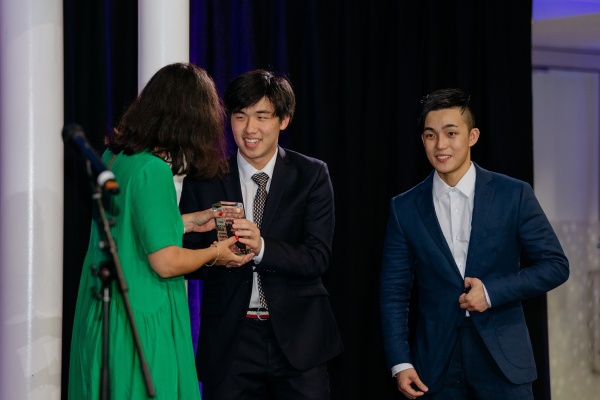
Sahinde Pala presenting the award to Jaeyun Han with festival founder Ryan Chow looking on
“We warmly congratulate Jaeyun.
“ENZ is pleased to support the International Student Film award and the film festival for the wonderful platform they offer young people to share their stories and collaborate. The festival is a great way to showcase what New Zealand offers as a film and creative study destination, and ultimately helps grow connections between international students and New Zealanders,” Sahinde said.
“I was blown away by the talent of all the students involved, they will have bright careers if they choose to enter the film industry. Jaeyun’s storyline, coupled with sophisticated editing and camerawork, made for a gripping and unforgettable film.”
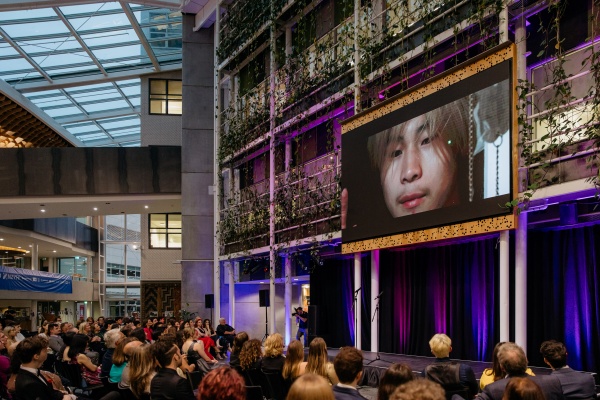
The winning Best International Student Film ‘Him’ being shown at the award ceremony
Jaeyun was one of three final nominees, all of whom were invited to an industry experience day exploring TVNZ, Department of Post and AUT last week, ahead of the awards.
The competition was judged by leaders in the industry. Marvel Studios Director of Technology Katie Hinsen, Weta Digital Visual Effects Associate Producer Jeremy Hollis, and Professor Welby Ings from AUT made the final decisions.
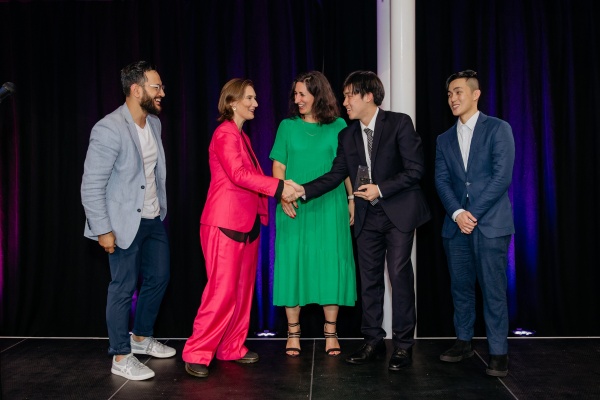
Judges Jeremy Hollis and Katie Hinsen congratulating Jaeyun Han alongside Sahinde Pala and Ryan Chow
“A teacher at school encouraged me to enter the festival and I didn’t think I had a chance of winning. This is such a surprise and an honour,” Jaeyun said.
He received a $500 cash prize and mentorship session with New Zealand cinematographer Phillip A.T Smith, who has worked on notable films such as ‘Mad Max Fury Road’, ‘Dune’ and ‘District 9’.
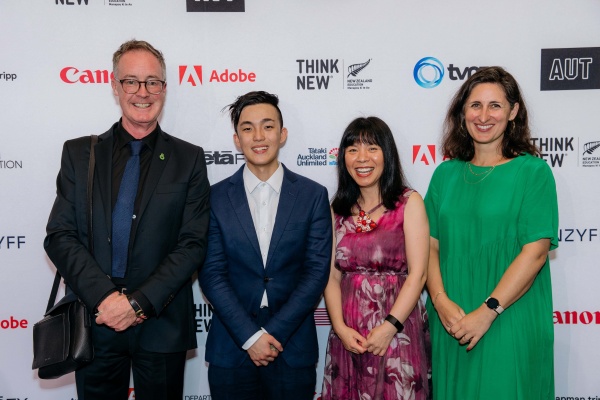
From left to right: ENZ Student Experience Manager Ross Crosson, festival founder Ryan Chow, Senior Advisor Student Experience Faymie Li and Sahinde Pala
NZYFF is founded by Ryan Chow, an international student from Canada studying towards a Bachelor of Business and a Bachelor of Communications Studies at Auckland University of Technology (AUT).
Ryan is passionate about providing an opportunity for youth to have their work celebrated and connecting them with industry professionals to kick-start their careers, which is how NZYFF came to be founded.
Jaeyun’s film is available to view here, and the other nominated films are available to view on the NZYFF website here.
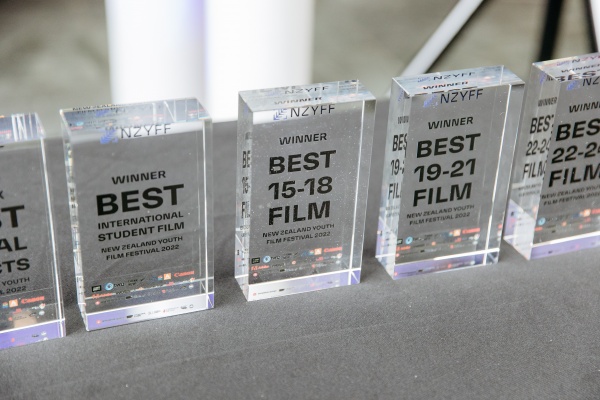
Trophies presented to the category winners
-
Looking back and looking ahead in India
“We’ve seen some successes and we also have some learnings to share with the sector,” says Jugnu Roy, ENZ’s Director of Engagement based in New Delhi.
“With New Zealand’s borders remaining closed for the first half of 2022, it was certainly a challenge to sustain the Indian student pipeline into New Zealand for higher studies. We knew going conventional wouldn’t help, and so we amped up our PR efforts.”
Aligned with ENZ’s approach of offering future-focused education, the team targeted learning opportunities for tertiary students under the umbrella of an integrated campaign – Unlock Potential for the New You. Using digital platforms as well as mainstream media, the strategy included a mix of suitable learning opportunities and unique ways of engaging with our stakeholders. This successful campaign won Gold awards at 2022 South Asia SABRE Awards, ETBrandEquity Kaleido Awards, STAKES PR & Communications Excellence Awards 2022; Silver at Adgully IMAGEXX Awards 2022 and a Bronze at Campaign India PR Awards 2022.
Kick-starting the year with the first event of its kind, ENZ’s India team hosted the ‘Women of the Future’ virtual event. To ensure maximum reach, we collaborated with leading digital platforms such as Femina India and Tweak India, among others, achieving more than 5.8 million impressions. More recently, the collaboration with popular Indian celebrity Soha Ali Khan is helping to create a stronger recall value of New Zealand among Indian study abroad aspirants.
2022 was also a year of big announcements from New Zealand such as the global I AM New Campaign, the reopening of New Zealand’s borders, new scholarships exclusively for Indian students, and a series of visits from New Zealand universities to name a few. Supported by our PR agency, Ruder Finn India, these announcements all made headlines in prominent Indian publications and portals including The Hindu, The Indian Express, Financial Express, and Education Times.
“It’s always a challenge to be heard,” Ms Roy says.
“Some types of stories are much more likely to be picked up than others. For example, stories about our borders reopening, new research on Covid-19, scholarships for Indian students, the United Nations Sustainable Development Goals (SDGs) are of interest, as well as stories about Indian students or academics.
“Our team is always interested in success stories involving Indian students, and we look to New Zealand education providers to help us with sourcing these.
“It’s also important for institutions to be selective about the timing of their announcements, so journalists have the space to focus on each story, rather than choosing between multiple announcements at the same time.
“It's good to establish a single spokesperson for a given institution, and to ensure that Indian journalists seeking information get a timely response – if it’s a wide-ranging article they are likely to go ahead without input from New Zealand, which is a missed opportunity.”
The team is busy pulling together their plans for 2023, including how best to profile these initiatives to ensure high visibility.
“Finally, I would really encourage New Zealand tertiary education providers to think carefully about what Indian students and their families are seeking from investing in an international education experience, and how individually and as a sector we can work together to meet those expectations,” Ms Roy says.
-
Innovative leadership programme funded by PIF proves great success
The Crusaders partnered with Christchurch-based education provider Boma to develop an engaging online leadership programme sharing the Crusaders Way with rugby coaches for all age levels. The programme draws on rugby legends Scott Robertson, Robbie Deans, Kieran Read and Samuel Whitelock to help participants build a connected and skilful team.
The Crusaders chose to collaborate with Boma because of the values alignment between the two organisations, combined with Boma’s expertise in crafting compelling, impactful, scalable online learning experiences.
Boma is a recipient of ENZ’s Product Innovation Fund, which assists in the development of programmes that deliver new, meaningful and unique learning experiences from New Zealand, for the world.
The funding allowed Boma to embark into a new area and develop the Crusaders pilot programme. Boma already runs events, workshops, and courses, and has worked with leading organisations in Aotearoa and around the world. Some of Boma’s clients include IAG, Meridian Energy, Stuff and New Zealand Trade and Enterprise.
While fully on-demand online courses have been around for a long time, they typically generate low completion rates. Boma’s approach is different, creating a cohort of learners who move through the programme together, leveraging pre-recorded video with time-sensitive community engagement.
Boma founder Kaila Colbin says their unique method delivers extraordinary outcomes.
“Our programmes are designed to offer the quality and impact of Stanford, the scalability of Masterclass, and the excitement and shared experience of TED,” she says.
Kaila explains that the coaches have the flexibility to complete the course in their own time but have a sense of urgency and accountability because of the community element.
The two-week pilot was completed by 114 coaches from 14 countries. It had glowing written feedback and earned a Net Promoter Score, or NPS, of 80%. NPS is a widely used customer satisfaction benchmark in which the potential score ranges from -100 to +100. A positive score is considered good and a score above 50 is considered outstanding.
Boma has big plans for the future, growing from rugby leadership to sports leadership to business and general leadership.
Registrations are open for the next Crusaders course, which starts on 30 January 2023.
Find out more about Boma here and find out more about the Crusaders Coaching Leadership Programme™ here.
-
Europe market update for secondary schools
As the sector rebuilds capability and welcomes international students back to New Zealand, this session will provide valuable information to secondary school staff wanting to refresh their knowledge or learn more about working with education agents and recruiting school students in Europe.
We are hosting one 1.5-hour Zoom session on Thursday 16 March from 3.30-5.00pm NZT.
The session will introduce schools to ENZ’s Europe team, provide an update on the market, and have guest speakers on hand to share their experiences of working in Europe.
In previous years, many students from Germany, France and Italy have travelled to New Zealand on student exchanges, seeking new experiences at New Zealand high schools. These countries are a priority focus for ENZ staff based in Europe.
In 2019, 1855 German students, 406 Italian students, and 370 French students spent time studying in New Zealand high schools. At least 66% of German international students were enrolled in schools in 2020, making this the largest subsector for Germany students.
Register for the session here.
Visit IntelliLab here to learn more about the Europe market.

